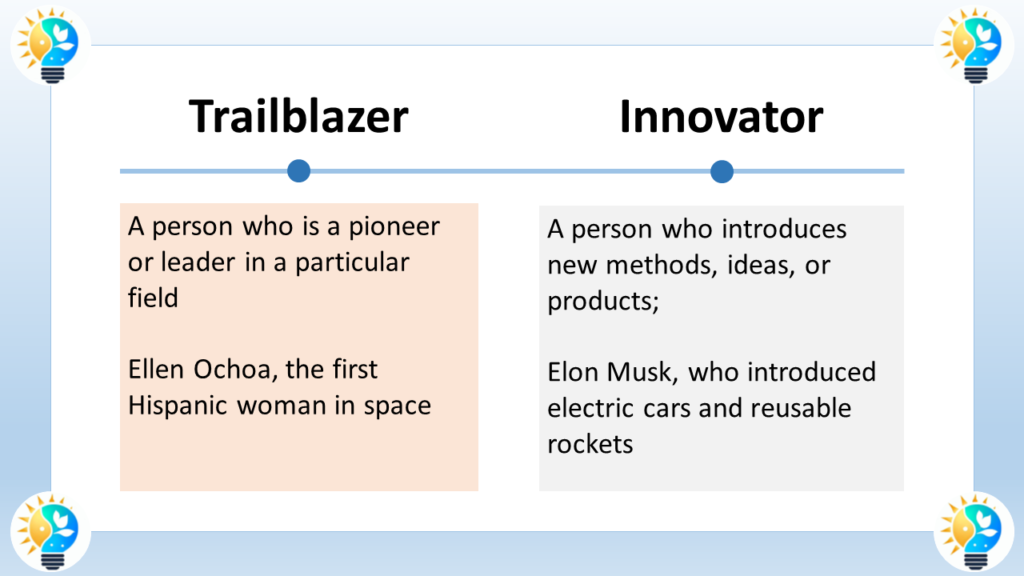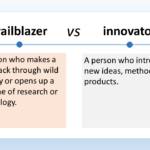An innovator is someone who introduces new ideas, methods, or products, often with added value or improvement over what already exists, focusing on practical implementation and market adoption.
A trailblazer, on the other hand, is someone who is a pioneer or a leader in exploring new territories or breaking new ground in a particular field or industry, often setting a path for others to follow.

The concepts of innovator and trailblazer are closely related and often used interchangeably because they both involve leading the way into uncharted territory. However, there are subtle differences in their connotations and applications which can be distinguished.
Definition
Innovator
An innovator is someone who introduces new ideas, methods, or products. Innovators are responsible for pushing boundaries in their fields and can be found in any discipline, from technology to education.
Characteristics of an Innovator:
- Originality: Comes up with new concepts that did not exist before.
- Problem-solving: Finds unique solutions to existing problems.
- Implementation: Applies their ideas in a practical setting.
- Influence: Has an impact on the way things are done in their industry.
Trailblazer
A trailblazer is an individual or group that is the first to do something; they blaze a trail for others to follow, often by doing something unprecedented or innovative.
Characteristics of a Trailblazer:
- Pioneering: First to undertake a particular endeavor or venture into a new area.
- Leadership: Leads the way for others to follow.
- Courage: Exhibits boldness in facing the unknown or untested.
- Lasting impact: Creates pathways that have a long-term influence on future developments.
Synonyms of Innovators
- Change-maker: An individual who actively contributes to positive and transformative changes, often in social or environmental contexts.
- Creator: An individual who brings something into existence, whether it be a product, work of art, or concept.
- Entrepreneur: A person who organizes and operates a business, taking on financial risks in the pursuit of new opportunities and innovation.
- Groundbreaker: An individual who introduces new ideas, methods, or technologies, breaking new ground and paving the way for advancements.
- Inventor: Someone who devises and develops a new product, process, or device, typically through creativity and ingenuity.
- Initiator: Someone who starts or sets a process or series of events in motion, often with the aim of achieving a specific goal.
- Instigator: Someone who initiates or provokes a particular action or event, often with the intention of inspiring change.
- Leader: A person who guides or directs others, often by setting an example and inspiring them to achieve common goals.
- Originator: The person who first brings a new concept, idea, or creation into existence.
- Pioneer: Someone who is among the first to explore or settle in a new area, and metaphorically, someone who is at the forefront of new developments or ideas.
- Prodigy: A person, especially a young one, with exceptional abilities or talents in a particular field.
- Progressive: Someone who supports or advocates for innovation, reform, and progress, often in social or political contexts.
- Reformist: A person who advocates for and works towards making gradual improvements or changes, especially in social, political, or economic systems.
- Revolutionary: A person who advocates or supports a significant and radical change, especially in politics or social structures.
- Trailblazer: A person who is a pioneer or innovator, leading the way in a particular field or activity, often creating a path for others to follow.
- Trendsetter: A person or entity that establishes or popularizes a new trend or style, influencing others to follow suit.
- Visionary: Someone with an exceptional ability to imagine or plan the future, often with innovative ideas or insights that go beyond current norms.

Innovation is considered as a driving force in progress.
It includes the introduction of novel ideas, methods, or products that bring positive change and advancement.
For more information about innovations, check our glossary
Relationship and Relevance
Innovators and trailblazers are both vital to progress, often leading to significant advancements in their respective areas. Their relevance lies in their ability to see beyond the current state of affairs and to forge new paths that did not previously exist. While an innovator is typically someone who creates and implements new ideas, a trailblazer is specifically recognized for being the first to do something, thus setting a precedent.
The terms “innovator” and “trailblazer” both refer to individuals who demonstrate creativity and leadership in their respective fields. While there are similarities between the two, there are also distinct differences in their connotations and implications.
- Definition:
- Innovator: An innovator is someone who introduces new ideas, methods, or technologies. They are creators of new concepts and solutions [1].
- Trailblazer: A trailblazer is someone who pioneers a new path or field. They are the first to explore uncharted territories and set a precedent for others to follow [1].
- Focus:
- Innovator: Innovators primarily focus on generating new ideas and pushing the boundaries of existing knowledge. They strive to create novel solutions to problems and improve upon existing systems [1].
- Trailblazer: Trailblazers, on the other hand, focus on breaking new ground and opening up new possibilities. They venture into unexplored areas and create opportunities for others to follow in their footsteps [1].
- Impact:
- Innovator: Innovators often have a significant impact within their specific domains or industries. Their contributions can lead to advancements, improvements, and the creation of new markets [1].
- Trailblazer: Trailblazers have a broader impact as they pave the way for others to explore and innovate. They inspire and motivate others to think differently and embark on their own journeys of discovery [1].
- Approach:
- Innovator: Innovators typically work within existing frameworks and build upon existing knowledge and practices. They may identify gaps or inefficiencies and propose innovative solutions to address them [1].
- Trailblazer: Trailblazers take a more pioneering approach, often challenging established norms and conventions. They are willing to take risks, explore uncharted territories, and embrace unconventional methods [1].
- Timeframe:
- Innovator: Innovations can occur more frequently and on a shorter timescale. Innovators may introduce new ideas or technologies that quickly gain acceptance and adoption within their respective domains [1].
- Trailblazer: Trailblazing efforts often require sustained dedication and perseverance over a longer period. It takes time for others to recognize and follow the path set by the trailblazer [1].
In summary, while both innovators and trailblazers contribute to progress and change, innovators focus on generating new ideas and improving existing systems, while trailblazers pioneer new paths and inspire others to explore uncharted territories.
The key difference between an innovator and a trailblazer is:
Innovators are focused on expanding beyond existing products and services, exploring new pricing models, delivery methods, customer engagement, and business models. They have a well-rounded set of skills and capabilities to internally drive invention and innovation within an organization.
In contrast, trailblazers are the ones who help open up new lines of research, technology, or art.[2] Trailblazers are the first to venture into uncharted territory and establish new frontiers.[1][2][3] They introduce groundbreaking concepts that can be paradigm-shifting, even if they don’t immediately disrupt existing markets.
While innovators transform and improve upon existing ideas, trailblazers create entirely new concepts that push the boundaries of what is possible.[2] Innovators operate within the confines of current markets, while trailblazers open up new frontiers that others can then build upon.[1][2]
In summary, innovators drive internal change and evolution, while trailblazers introduce radical, unprecedented ideas that can lead to revolutionary breakthroughs in their respective fields.[1][2]
Context for Using Each Term
The term innovator should be used when discussing someone who has developed a new idea or method and has successfully applied it, changing the way things are done in their field. On the other hand, trailblazer is used when emphasizing a person’s or group’s role as the first to embark on a particular path, often clearing the way for others.
Examples
Example of an Innovator
Mark Zuckerberg is regarded as an innovator in the field of social networking for creating Facebook, a platform that changed the way people connect and communicate online.
Example of a Trailblazer
Amelia Earhart is often celebrated as a trailblazer in aviation for being the first woman to fly solo across the Atlantic Ocean, inspiring others to explore and push the boundaries in flight.
FAQs
Q: Can someone be both an innovator and a trailblazer?
A: Yes, it’s possible for someone to be both an innovator and a trailblazer if they not only introduce new ideas but are also the first to take certain actions or create new paths.
Q: Is being a trailblazer always associated with innovation?
A: Not necessarily. A trailblazer can be someone who is the first to achieve something even without innovation, such as being the first to climb a mountain or enter a new market.
Q: Do innovators or trailblazers always succeed in their endeavors?
A: Success is not guaranteed. Both innovators and trailblazers take risks, and while they may pave the way for future successes, they themselves do not always achieve immediate success.
In conclusion, while innovators are known for creating new methods or ideas, trailblazers are recognized for being the first to venture into new areas, setting an example for others. Both are instrumental in fostering growth and advancement in their respective domains.
Resources
- Which one is better to be, an innovator or a trailblazer? Why?
- To Succeed As An Entrepreneur, Innovator Or Trailblazer, You Must Find Your True Purpose
- Innovator vs Trailblazer – What’s the difference? | WikiDiff
- Bowling This Month – Radical Innovator Solid vs. Radical Trail Blazer Solid
- Thesaurus.plus – Trailblazer
- YouTube – Video
- Innovations4.eu – What is the Difference Between Innovator and Leader?










